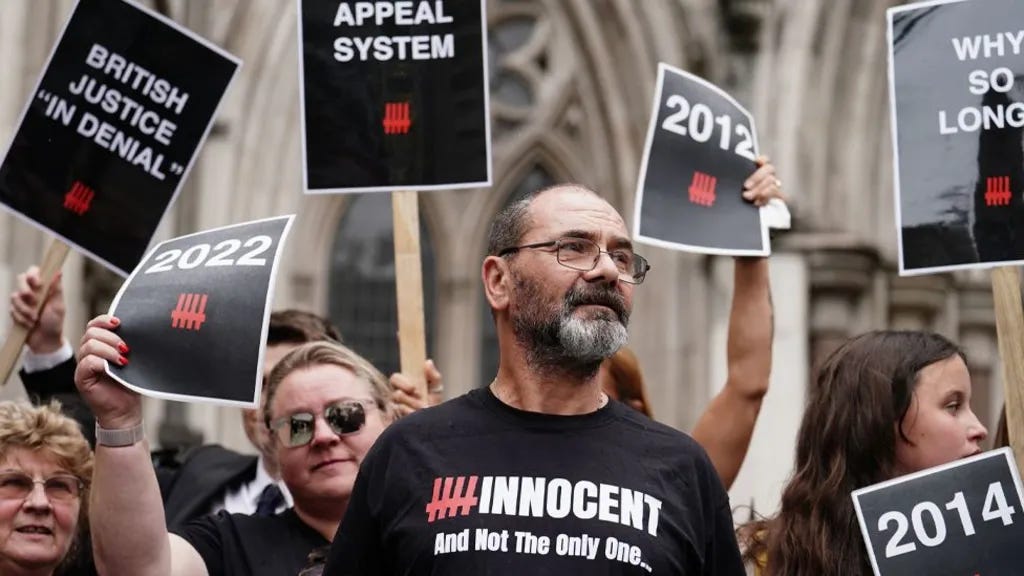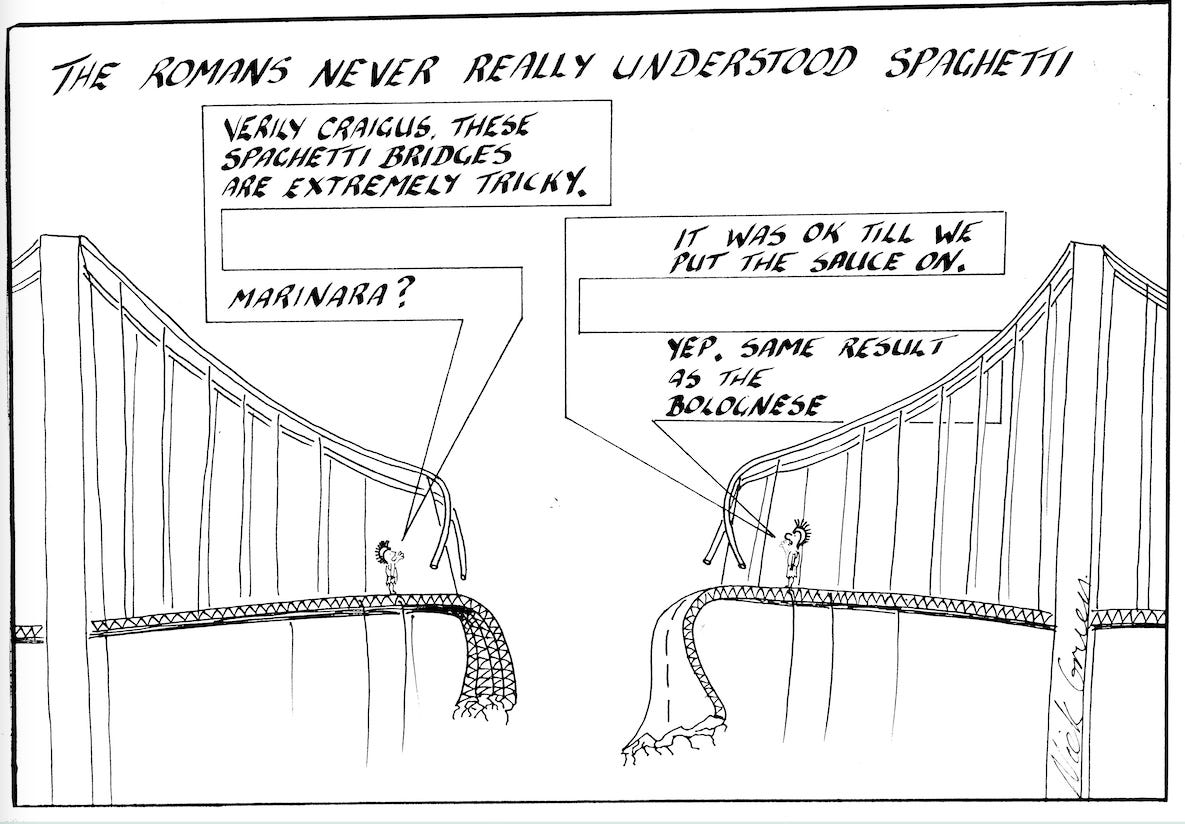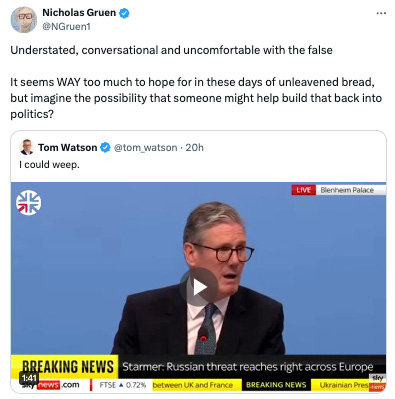Rory Stewart on Ignorance
When Rory proposed I participate in this six part documentary series as one of the guests, I was very pleased to do so. As the very artwork in the header to this newsletter suggests, I favour foregrounding our ignorance in our claims to knowledge. But also wondered quite what he had in mind and how he’d bring it off. Though some pundits vehemently disagree, I think he’s done so brilliantly and in a way that brings on a shock of recognition. Though I couldn’t quite see how he’d do it, he realised it was completely obvious. Just do it — foreground ignorance, don’t just talk about it. Stop making it an affectation, an afterthought and build it in.
Next week I’ll publish a recording of the interview I did with Rory from which they chopped segments to place in some of the episodes — particular, as you would expect Episode 4 on politics. Rory discusses the case for our politics to be supplemented with citizen assemblies. As we know, he’s a fan of the idea of a citizen assembly having the right to impose a secret ballot on a house of the legislature if it disagrees with its open vote. I have no idea where he got the idea — some ‘Australian academic’ apparently. In the meantime you can find the podcast series on the BBC website here.
Here it is on Apple’s platform.
And don’t miss Nietzsche on ignorance in this week’s heaviosity half-hour.
Me on lowering the political temperature
The producer of Rory’s doco Dan Tierney asked me onto the Moral Maze. It sounded like it could be a good opportunity to get the word out — an hour on the topic of lowering the temperature in politics. Turns out it was quite a challenging format, as you’ll hear. Rather than being part of a free flowing discussion, I was one of four ‘witnesses’ interviewed by the panel. I get a tad over ten minutes being questioned by two members of the panel. And you have to keep it snappy — which can be tricky if you’re trying to convey an unfamiliar idea or a familiar idea that you’re trying to make a little unfamiliar — to trick people into thinking about it. But it was fun trying to get the message across as best I could. (I start at 35 minutes in) and I recommend Brian Klaas who was on immediately before me. (His session starts at 23.20.)
Helen Pitcher (OBE) inducted into the Paula Vennells (Rev, CBE), Kathryn Campbell (AO) hall of unaccountability fame
HT: Felix Martin for alerting me to this new entrant in the annals of elite dishonour and decline (unaccountability division). As you may remember, the Rev Paula Vennells CBE kept brazening it out at Her Majesty’s Post Office and, perhaps to calm her nerves and settle her conscience as she she presided with full knowledge over corruption that jailed the innocent and drove others to suicide, she gave sermons on Sunday. Katherine Campbell, A.O. saw little wrong with her own conduct in presiding over the persecution of tens of thousands of Australians on welfare several of whom suicided. Anyway, unlike Vennells, she’s hung onto her A.O. and those responsible for smoothing over the mess have said nothing about it (or nothing that I’ve noticed).
Still, if you don’t have the guts to take her A.O. off her, I guess you can do the next best thing and give Colleen Taylor an honour for doing the right thing and trying to stand up to the bullies led by Kathryn. And just so no feathers get ruffled, you give her the bottom honour, two rungs down from Kathryn’s A.O.
Anyway, Helen Pitcher OBE is the chair of the UK Criminal Cases Review Commission. Andrew Malkinson was wrongly convicted of rape and was serving a life sentence. It was clear after five years that things needed to be reviewed but the Commission failed. Now 12 years later Malkinson has been exonerated. Ms Pitcher has apologised ‘unreservedly’ to Mr Malkinson. She’s refused to be interviewed claiming the need to wait for various processes to be completed. Now they have been.
But, as the CCRC’s website says “There will be no media interviews at this time”.
Malkinson was interviewed on the BBC. If you scroll to 1:33:45 on this link you can hear him. Also from the BBC:
The damning report into the Criminal Cases Review Commission concludes he could have been freed five years after receiving a life sentence for a 2003 rape.
The report reveals the CCRC’s investigators and leaders failed to follow up evidence of innocence right up to 2022. … Ms Pitcher has apologised in a statement. She is unavailable to be interviewed today for personal reasons. …
He was convicted solely on contested eyewitness accounts that placed him near the scene, even though he did not resemble the suspect or bear a deep facial scratch injury that the victim had inflicted on her attacker.
Three years after he was jailed, forensic scientists, using new DNA techniques, found key evidence from an intimate part of the victim’s clothing that pointed to a different unknown man.
By 2009, Greater Manchester Police, the Crown Prosecution Service and the CCRC all knew of this lead - but the miscarriages agency rejected the first of Mr Malkinson’s three pleas for help. …
In 2013 the agency failed to review the file again, despite the Court of Appeal exonerating another man of rape in near-identical circumstances.
It then dismissed Mr Malkinson’s further plea for help in 2019 - and considered turning him down a third time in 2022.
The report finds that agency only referred the case back to judges after Appeal, a legal charity acting for Mr Malkinson, won a battle to have new DNA analysis conducted. Mr Henley said he had no confidence the CCRC would have ever done the work itself. …
He said that statements by the CCRC’s chair, Helen Pitcher, had not properly reflected the agency’s failings and criticisms of the CCRC’s decision not to apologise immediately to Mr Malkinson after he [was] exonerated in 2023 were “well-founded”.
Today, Andy Malkinson called on Helen Pitcher to resign - or for the government to sack her. …
“If Helen Pitcher is truly sorry, she’ll step down. The CCRC’s delay in publishing this report and its decision to conceal the names of the personnel whose actions caused me so much suffering is shameful.”
Speaking of Kathryn Campbell, A.O.
Me with Leon Gettler on RoboDebt debacle 2.0
Hunter on Joe
Government by amnesia: Child protection edition
From the NSW Audit Office. Emphases in the original.
I wonder who’s been sacked for this. Only kidding.
The NSW child protection system is inefficient, ineffective, and unsustainable. Since 2018–2019 there have been increasing child protection reports, escalating out of home care costs, insufficient placement options for children with complex needs, and limited services or support for children and families engaged in the child protection system. Despite numerous reviews into these issues, DCJ has failed to make the necessary changes to ensure its child protection service model meets the needs of children and families.
In 2022–2023 DCJ received more than 400,000 child protection reports and identified 112,592 children that met a threshold for presumed ‘risk of significant harm’. However, 75% of these children did not receive a home-based safety assessment by a DCJ caseworker to confirm these risks. Their cases were closed without any follow up services from DCJ, and DCJ does not know the outcomes for these children.
While DCJ has legislative obligations to support children and families during child protection processes, the agency does not provide services or support to the majority of children presumed to be at risk of harm. In 2022–2023, DCJ data shows that of the 112,592 children presumed to be at risk of significant harm, 10,059 children received some form of family support service. DCJ was not able to provide a breakdown of the types of services available to these families in 2022–2023, due to ‘data quality issues’. The effectiveness of these limited services is not evaluated or known.
DCJ is not meeting its legislative requirements under the Children and Young Persons (Care and Protection) Act 1998 (the Care Act) to ensure that:
‘…children and young persons receive such care and protection as is necessary for their safety, welfare and well-being’
‘…appropriate assistance is rendered to parents and other persons … in the performance of their child-rearing responsibilities in order to promote a safe and nurturing environment’.
DCJ dedicates significant human resources to repetitious desktop assessments of child protection reports, but does not allocate sufficient resources to support families and children. While DCJ refers children and families to a range of different services, DCJ does not collect or collate any referral data for the purposes of planning a responsive service sector. DCJ does not have reliable information to understand the demand for therapeutic services, and therefore cannot plan or commission a relevant service profile. Every year, more than a third of children are re-reported. …
Successive independent reviews into the child protection system have recommended that DCJ redirect its resource profile to an early intervention, therapeutic model of care. The reviews recommended that DCJ proactively address risks to children through effective support for families. DCJ’s unchanged expenditure profile over the past five years, shows that the agency has made minimal progress in redirecting its resources to this model.
DCJ has not monitored, assessed, or reported on the mental health and wellbeing of children in out of home care.
The Care Act requires that agencies consider the ‘safety, welfare and wellbeing of the child’ as ‘paramount’ in any action or decision affecting the child. In order to meet this duty of care, DCJ must measure the wellbeing of children in out of home care, and make decisions about appropriate services and support for their wellbeing. …
And the kicker is the velvet gulag:
In August 2023, there were 471 children living in emergency care environments in NSW, with 30% of these children living in hotels, motels, and serviced apartments. The average cost per child in hotels, motels, or apartment accommodation was $829,000 per annum.
From 2018–2019 to 2022–2023, the overall costs of out of home care increased from $1.35 billion to $1.9 billion, largely due to increasing emergency care costs.
ESG: from hype to tumbleweed
HT: Gene Tunny with whom I discussed these contradictions in this podcast. Things seem to be catching up with the Nanny corporation flim-flam of ESG.

Outsourcing our hypocrisy on greenhouse
Bridges of words and bridges to nowhere
Competitive incredulity anyone?
On the one hand the right will meet our emissions targets with vast infrastructural expenditure on technology which is known but takes decades to build at scale and there are numerous examples of huge cost overruns and delays. Oh, and the party wanting to do this is beholden to fossil fuel money and is full of climate deniers. And they have a record of stalling tactics like ‘carbon capture’. So you might suspect they’re not really serious — that their policy is a policy to get through a radio interview not a few decades in the wild — like Tony Abbott’s ‘Direct Action’ was. And just the word ‘nuclear’ sounds scary (nobody mention the word submarines!). So opposing it works well for the left — including those, like the Greens, claiming to put the environment first.
On the other hand they and the ALP want to do it with renewables. Which requires, you guessed it, vast expenditure and uncertainty of its own. I’m a little more sympathetic to the left just because they actually do show some desire to do something. But remember, they know that if they really open up on how much it will cost — and the profound uncertainties entailed in the honeyed words of getting all the way past the intermittency problem to zero emissions — well they’d lose the next election.
And asking a politician to lose an election by telling the truth is like asking the KFC CEO to lose sales by putting less sugar, fat and salt in the chicken. It’s not impossible that it could happen once, but it can’t happen in the normal course of events any more than lions and tigers can become vegans.
Our political system is the means by which we outsource our hypocrisy. We want tough decisions to be made, and we say we want politicians to tell us the truth, but we punish politicians who do that. If either side were candid about the likely costs and uncertainties, first the media would be after them for how ‘gaffe prone’ they were becoming — and not just the Murdoch press. The folks on the ABC Insiders and AM and PM would keep us breathlessly informed of how badly the race was going for the truth-tellers. And then we’d vote against them.
Anyway, if you know where to look, you can see cracks appearing in the bridge to the future politicians have been forced to build with words more than deeds, in Australia and in Europe.
The FT’s Martin Sanbu takes up the story
[N]ews that European battery projects are being scrapped or seriously scaled down is an important sign of things going wrong. … [S]lowing EV sales have undermined expectations of market demand for … battery capacity. …
This exemplifies a broader problem: a private sector deeply lacking in faith that its political leaders can move from words to action. … [EU] leaders have committed to phasing out new internal combustion engines over the next decade, while vowing not to let Chinese imports wipe out domestic carmakers. If both were credible, EU car manufacturers would be investing hand over fist to meet imminent EU demand for some 10mn EVs a year. That they are not — with the fallout for batteries and other parts of the supply chain — proves they do not believe the political goals will be met. …
This lack of faith holds back everything from renewable generation (will the grids be there to offload peak power?) to electrolysers (will there be enough buyers of green hydrogen?). Fundamentally, policy needs to make the private sector trust demand at scale will be there. That is what China has long been adept at ensuring, and is the true cause of the US Inflation Reduction Act’s huge effect on factory building.
The EU needs to do the same, in its own way. This is not primarily about joining a subsidy race. But it does require enlisting fiscal policy, tax design and credit policy so as to forge new or fledgling markets into solid existence. … The quid pro quo for any budget cuts prompted by the new fiscal rules, then, must be more EU-level funding to sustain long-term demand for green tech: EV leasing schemes, green infrastructure, grid construction, household electricity storage and so on.
Then twist taxes more to favour the new markets you aim to create, and commit to keeping them that way. Norway’s extraordinary adoption of EVs was achieved by granting them exemptions from onerous taxes on conventional cars, plus traffic privileges (access to bus lanes and cheap parking). …
Renewable energy projects are being cancelled because once-attractive financing profiles look unviable with today’s interest rates. But … the European Central Bank could surgically loosen financial conditions for green investment by adapting its “targeted long-term repurchasing operations”. … This would fulfil, not violate, the ECB’s mandate, which requires it to support the EU’s general economic policies so long as it safeguards price stability. … There is no reason, in truth, why Europe shouldn’t see a green investment boom. But the private sector needs to know that governments, too, mean business.
I love mosaics


Is Israel committing suicide?
I’m not the only one who thinks so. Here is Shlomo Ben-Ami, a former Israeli foreign minister
Iran’s recent decision to step up pressure on Israel through its proxies was influenced by Hamas’s surprising capacity to isolate the country and expose its weaknesses. Specifically, Iran could not ignore the fact that Hamas’s attack on October 7 thwarted Saudi Arabia’s plan to join the Abraham Accords and normalize diplomatic relations with Israel. …
Iran has recently made “alarming and unprecedented progress toward a military nuclear program,” according to Israel’s Institute for National Security Studies. But this doesn’t mean that Iran would launch its first bomb at Tel Aviv. Instead, with this nuclear umbrella, Iran could redouble its efforts to weaken Israel, using conventional means to bring about its collapse. Given Israel’s alleged second-strike capabilities, Iran understands that a nuclear showdown would likely result in its own destruction.
When Iran warns, as its mission to the United Nations did on June 28, of “an obliterating war” should Israel attack Lebanon, it wants to deter Israel and prevent a non-nuclear war that could destroy its Lebanese assets. Hezbollah joined the war against Israel only to save face with the Palestinians, and would be happy for Israeli Prime Minister Binyamin Netanyahu to agree to a ceasefire in Gaza that would extricate the Shia militia from the conflict.
Against this backdrop, the key enabler of Iran’s war of attrition is, in fact, Israel’s own government. Netanyahu’s unrealistic goal of achieving “a complete victory” in Gaza serves Iran’s strategy of miring Israel in an inconclusive conflict while orchestrating a long-term plan to destroy the Jewish state. By unnecessarily prolonging the war and refusing to accept a role for the Palestinian Authority in Gaza’s governance, Netanyahu’s government has isolated Israel, strained relations with its American benefactors, and eroded its own strategic deterrence.
It turns out that the only truly irrational, trigger-happy fanatics in this lethal equation are Netanyahu and his theo-fascist allies, who are determined to engage in an apocalyptic war in Gaza and Lebanon. As northern Israel burned from Hezbollah’s largest rocket barrage to date, and its civilian population was evacuated, Orit Strock, the minister of settlements and national missions from the Religious Zionist Party, exclaimed that this was a “time of miracles” for West Bank settlements. Strock was referring to the belief that God will destroy Israel’s enemies and bequeath them the land.
These messianic hallucinators have a willing collaborator in Netanyahu. Together, they are doing more to annihilate the Jewish national project than Iran could ever hope to achieve on its own.

Silence and cowardice
I was thinking the very same thing as I posted last week’s substack where I talked about silence. I imagine one reason that the Soviet Union went through a dreadful patch where it kept appointing new leaders and watching them die of old age was because of silence. People knew the leaders they were choosing weren’t going to cut the mustard, but instead, might fertilise it from below. But what thanks would they get for saying so? None. So that’s what’s been going on in both the Republicans and Democrats in the US. Who are you going to trust, the power of the presidency in your next attempt to get your party’s nomination or your lying eyes telling you that Joe’s impersonation of senility is becoming harder and harder to deny. Donald is crazier than ever, but his problem isn’t senility. People knew how disastrous Boris Johnson was, how he was a congenital liar. The ALP caucus knew that of Mark Latham, if not before he got the job of leader then not long afterward. Their job in representative democracy is to use that knowledge to protect us from such a person. But silence was better for their careers. At least until it wasn’t.
When that kind of silence reigns, disaster follows. Here’s Ruxandra making the point in a different context. That context is careerism in academia.
Nate Silver had a good piece arguing that Democrats have basically shot themselves in the foot by ignoring Biden’s obvious signs of decline. Instead of facing reality, they preferred to lie to themselves that the very legitimate worries about his age were down to “misinformation” spread by nefarious actors. Yet, ultimately, reality caught up with Biden and the Democratic establishment and now the party is pretty much stuck with a candidate that stands a very slim chance of defeating Trump. I’d like to add another point to Nate’s analysis: namely, the role intellectual courage (or lack thereof) had in this. A lot of people, including journalists, public intellectuals, staffers and the list goes on, could see the truth with their own eyes, but refused to openly voice their opinions due to fears “for their career.”
I mention this because, if I had to choose a failure mode of our current intellectual/epistemic environment, it would probably be a lack of intellectual courage. … But the consequences of intellectual cowardice are often much less obvious [than they are with Biden]. Tiny and scattered all over the place as they are, it’s easy to ignore them. But they do add up to create an intellectual environment that’s bland, stultified and worst of all, incapable of guiding people to the truth. Because the truth emerges via constant argumentation — something that cannot exist if everyone is afraid to say what they think. As a result, I think intellectual cowardice (as well as educational polarization) is at least to some extent to blame for what Matthew Yglesias describes as the problem of “elite misinformation.” …
The extent to which academia suffers from this issue was made clear to me after I started writing on the Internet. I get a lot of DMs from academics, often with much more job security than me, who tell me they agree with this article or the other but that they cannot say it because of x,y,z reason. Now, don’t get me wrong: it’s totally normal to keep your opinions on some topics private. But I am talking about things that are often adjacent to their work and which are not even that controversial. For example, this happened a lot when I wrote about why I think the premise behind misinformation studies is fundamentally flawed. And from academics doing social science related stuff! If people are afraid to voice opinions about this relatively milquetoast topic, it seems to me like we are in a bad place in terms of our ability to openly criticize ideas. And if you do not believe me, then you should check this piece by Matthew Yglesias, where he reports the same thing happening to him. …
Being intellectually honest about a topic your academic (or journalistic, or any other type of intellectual) colleagues disagree with falls into the low potential upside courage bracket. There is stuff to be lost but relatively little to be gained. What’s worse, you will most likely not even be awarded the dignity of being openly cancelled: most likely, your career will become a bit shittier with each open disagreement you have, a dreary slog you cannot even wear as a badge of honour. You’ll become that which most ambitious people fear the most: a no-name. And you won’t even be able to tell where this comes from, to point to a culprit. If you are even a tiny bit ambitious the calculus is clear: shut up and agree. You need to be a bit mad to do it. (This is why very often the people who are intellectual courageous are often also incredibly weird.)
This makes me think that if we want more intellectual courage we cannot just assume it will spontaneously emerge from nothing. We need to actively incentivize it and nurture it, to nudge towards it looking more like the “high potential upside” type of courage. The question is: how?

Heaviosity half hour
Charles Sanders Peirce and the owl of Minerva
[I]ntellectual maturity with regard to clearness is apt to come rather late. This seems an unfortunate arrangement of Nature, inasmuch as clearness is of less use to a man settled in life, whose errors have in great measure had their effect, than it would be to one whose path lay before him. It is terrible to see how a single unclear idea, a single formula without meaning, lurking in a young man’s head, will sometimes act like an obstruction of inert matter in an artery, hindering the nutrition of the brain, and condemning its victim to pine away in the fullness of his intellectual vigor and in the midst of intellectual plenty. Many a man has cherished for years as his hobby some vague shadow of an idea, too meaningless to be positively false; he has, nevertheless, passionately loved it, has made it his companion by day and by night, and has given to it his strength and his life, leaving all other occupations for its sake, and in short has lived with it and for it, until it has become, as it were, flesh of his flesh and bone of his bone; and then he has waked up some bright morning to find it gone, clean vanished away like the beautiful Melusina of the fable, and the essence of his life gone with it. I have myself known such a man; and who can tell how many histories of circle-squarers, metaphysicians, astrologers, and what not, may not be told in the old German story?
Nietzsche on ignorance
One of my favourite passages of philosophy from an early essay by the unspellable one. And read on if you’re wondering what Nietzsche was doing thinking of a mosquito.
In some remote corner of the universe, poured out and glittering in innumerable solar systems, there once was a star on which clever animals invented knowledge. That was the highest and most mendacious minute of “world history”—yet only a minute. After nature had drawn a few breaths the star grew cold, and the clever animals had to die.
One might invent such a fable and still not have illustrated sufficiently how wretched, how shadowy and flighty, how aimless and arbitrary, the human intellect appears in nature. . . . For this intellect has no further mission that would lead beyond human life. It is human, rather, and only its owner and producer gives it such importance, as if the world pivoted around it. But if we could communicate with the mosquito, then we would learn that he floats through the air with the same self-importance, feeling within itself the flying center of the world. There is nothing in nature so despicable or insignificant that it cannot immediately be blown up like a bag by a slight breath of this power of knowledge . . . .
It is strange that this should be the effect of the intellect, for after all it was given only as an aid to the most unfortunate, most delicate, most evanescent beings in order to hold them for a minute in existence, from which otherwise, without this gift, they would have every reason to flee . . . That haughtiness which goes with knowledge and feeling, which shrouds the eyes and senses of man in a blinding fog, therefore deceives him about the value of existence by carrying in itself the most flattering evaluation of knowledge itself. Its most universal effect is deception. . . .
The intellect, as a means for the preservation of the individual, unfolds its chief powers in simulation . . . In man this art of simulation reaches its peak: here deception, flattering, lying and cheating, talking behind the back, posing, living in borrowed splendor, being masked, the disguise of convention, acting a role before others and before oneself—in short, the constant fluttering around the single flame of vanity is so much the rule and the law that almost nothing is more incomprehensible than how an honest and pure urge for truth could make its appearance among men. They are deeply immersed in illusions and dream images …
What, indeed, does man know of himself! Can he even once perceive himself completely, laid out as if in an illuminated glass case? Does not nature keep much the most from him, even about his body, to spellbind and confine him in a proud, deceptive consciousness, far from the coils of the intestines, the quick current of the blood stream, and the involved tremors of the fibers? She threw away the key; and woe to the calamitous curiosity which might peer just once through a crack in the chamber of consciousness and look down, and sense that man rests upon the merciless, the greedy, the insatiable, the murderous, in the indifference of his ignorance—hanging in dreams, as it were, upon the back of a tiger. In view of this, whence in all the world comes the urge for truth?



















